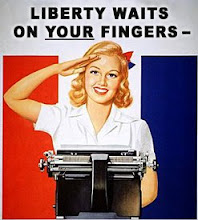"Are you gonna pull those pistols or whistle Dixie?" A quote from "The Outlaw Josey Wales."
I've watched bits and pieces of the three major interviews that have been conducted with Sarah Palin since she was announced as John McCain's running mate. I found three different approaches by each interviewer.
Charlie Gibson, of ABC, at times appeared above Sarah Palin, using a condescending tone, etc. I have seen other interviews of Gibson's and immediately noticed his colder and, at times, almost patronizing demeanor. He asked tough questions with no mercy, and pressed issues when not given a satisfactory answer (see http://www.youtube.com/watch?v=vHnzTN95kRc).
Sarah Palin, using a condescending tone, etc. I have seen other interviews of Gibson's and immediately noticed his colder and, at times, almost patronizing demeanor. He asked tough questions with no mercy, and pressed issues when not given a satisfactory answer (see http://www.youtube.com/watch?v=vHnzTN95kRc).
Contrast that with Sean Hannity of FOX news. From the offset Hannity wore a warm, adoring smile. He posed questions in a casual, kind way, asking about family and her thoughts on the world's issues - almost like a backyard bbq. Hannity, a Republican, obviously was going to help his girl out (see http://www.youtube.com/watch?v=tVR2QCH3-fg).
That brings us to the most recent interview with CBS's Katie Couric. In my opinion, Couric seemed to be the most balanced of all three interviews. She didn't appear overly warm, asked tough questions, but respectfully, and even cracked a slight smile from time to time. She wasn't condescending, but she wasn't idolizing Palin either (see http://www.youtube.com/watch?v=cP12aNzocSc).
After watching these interviews, I wonder to myself, who was the best journalist? Who delivered the story? Who presented the story in a way that gave unbiased context and meaning to it? Who constructed the social reality of Sarah Palin as a possible vp most effectively? Who, in effect, best represented the public?
Is it okay to show bias? Is it okay to be borderline disrespectful if it is someone you don't neccessarily respect? How do you hide your personal opinions, whether it be in print, online, or broadcast journalism?
I've watched bits and pieces of the three major interviews that have been conducted with Sarah Palin since she was announced as John McCain's running mate. I found three different approaches by each interviewer.
Charlie Gibson, of ABC, at times appeared above
 Sarah Palin, using a condescending tone, etc. I have seen other interviews of Gibson's and immediately noticed his colder and, at times, almost patronizing demeanor. He asked tough questions with no mercy, and pressed issues when not given a satisfactory answer (see http://www.youtube.com/watch?v=vHnzTN95kRc).
Sarah Palin, using a condescending tone, etc. I have seen other interviews of Gibson's and immediately noticed his colder and, at times, almost patronizing demeanor. He asked tough questions with no mercy, and pressed issues when not given a satisfactory answer (see http://www.youtube.com/watch?v=vHnzTN95kRc).Contrast that with Sean Hannity of FOX news. From the offset Hannity wore a warm, adoring smile. He posed questions in a casual, kind way, asking about family and her thoughts on the world's issues - almost like a backyard bbq. Hannity, a Republican, obviously was going to help his girl out (see http://www.youtube.com/watch?v=tVR2QCH3-fg).
That brings us to the most recent interview with CBS's Katie Couric. In my opinion, Couric seemed to be the most balanced of all three interviews. She didn't appear overly warm, asked tough questions, but respectfully, and even cracked a slight smile from time to time. She wasn't condescending, but she wasn't idolizing Palin either (see http://www.youtube.com/watch?v=cP12aNzocSc).
After watching these interviews, I wonder to myself, who was the best journalist? Who delivered the story? Who presented the story in a way that gave unbiased context and meaning to it? Who constructed the social reality of Sarah Palin as a possible vp most effectively? Who, in effect, best represented the public?
Is it okay to show bias? Is it okay to be borderline disrespectful if it is someone you don't neccessarily respect? How do you hide your personal opinions, whether it be in print, online, or broadcast journalism?











